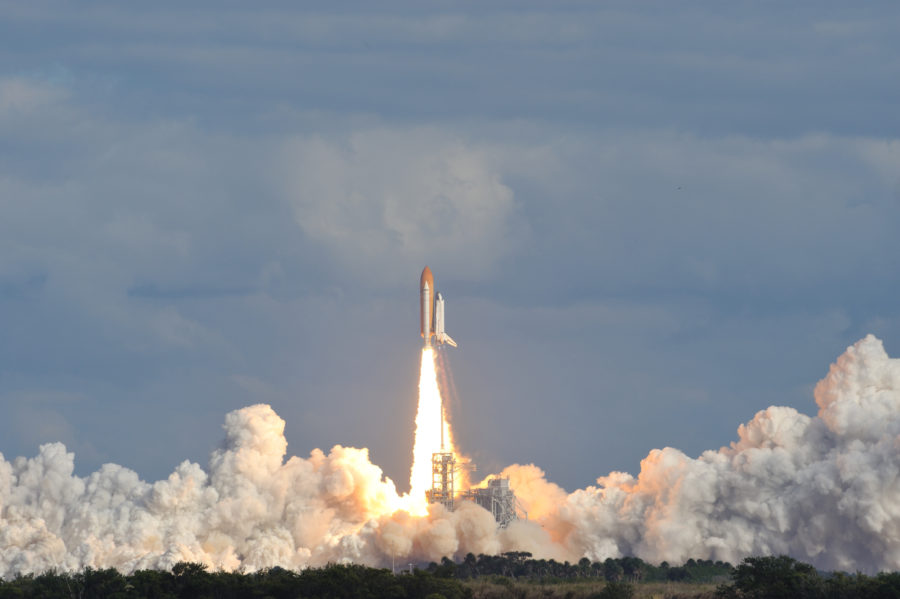6th June 2019 Geneva, Switzerland
Disarmament blog: space – the final frontier for arms control?

I spent part of last week at the Space Security Conference run by the UN Institute for Disarmament Research, which has become something of an annual fixture. It was excellent – the organisers brought together an amazing group of speakers from governments, academia, the media and industry, and I came away with a far better grasp of the issues than I had before. It really brought home to me how space is used today, who is using it, the complexity of the problems they face, and just what a difficult environment it is to operate in.
The Conference on Disarmament put ‘Prevention of an Arms Race in Outer Space’ (‘PAROS’) on its agenda in 1982. But space today is a very different place. We all depend on services that use satellites – navigation, weather forecasting, communications, and so on. As we saw with Elon Musk’s launch last week of sixty satellites as part of a new mega constellation, those satellites are increasingly launched and operated by private companies, and it’s often difficult to separate military from civilian services and applications. The primary threat today is not that weapons in space could attack ground targets, but that attacks on satellites, whether from the ground or from space, would cause chaos on Earth. I tend to think that, rather than talking about arms races and placements of weapons in space, we should be talking more broadly about how to maintain peace and security in outer space for all.
The problem is, many of the usual arms control solutions simply don’t work in that scenario. For starters, it’s hard to define what you’re controlling: pretty much anything can be a weapon in space if you use it to cause a collision. For another, it’s difficult to imagine a practical verification regime. Even assuming countries would agree to let others check the payload of every object being sent into space, there are plenty of perfectly legitimate capabilities (such as robotic arms to repair satellites, or nets to capture pieces of space debris) which could be used to cause harm. Space and ground objects could also have electronic capabilities that could interfere with satellites without being detected. As such, it’s behaviours, and the intent behind them, that matter in space, not the objects themselves.
It doesn’t help that the international system has not really responded to this rapid change. The last major treaty on these issues was the Outer Space Treaty of 1967. The distinction between PAROS in Geneva and the UN Committee on the Peaceful Uses of Outer Space in Vienna, mirrored in the UN General Assembly in the split of space issues between its First and Fourth Committees, seems arbitrary and increasingly hard to pin down. At this year’s UNGA there will be a joint meeting of the First and Fourth Committees, and it will be interesting to see if we can use that for a more holistic look at the challenges.
So how to proceed? For the reasons I’ve set out, a comprehensive treaty on the weaponisation of space is not practical, nor does it really address the problem. What we need instead is an incremental approach, looking for solutions – legal instruments or voluntary measures – to practical problems that will establish rules of the road for private or government space users, and build habits of trust and co-operation. As with most arms control issues, the solution lies in compromise – between the costs of constraining certain activities in space, and the long-term benefits of those constraints for all states. Building on events like the Space Security Conference, and the UK-sponsored meeting with academia, industry and a range of states at Wilton Park earlier this year, I hope we can find new approaches to agreeing norms of behaviour in space, to the benefit of all.
I read your piece with interest. Take a look at my piece: Brian G. Chow, Space Arms Control: A Hybrid Approach, Strategic Studies Quarterly, May 31, 2018, https://www.airuniversity.af.mil/Portals/10/SSQ/documents/Volume-12_Issue-2/Chow.pdf. Instead of banning all weapons in space, which, like you say, is not possible, I try to prevent potential antisatellite weapons from getting too close to our satellites. If you have questions, please contact me at brianchow.sp@gmail.com.
Aidan Liddle, thanks for the article post.Really thank you! Great.